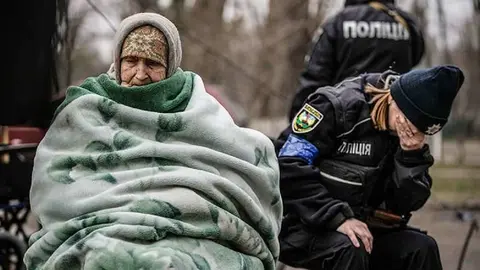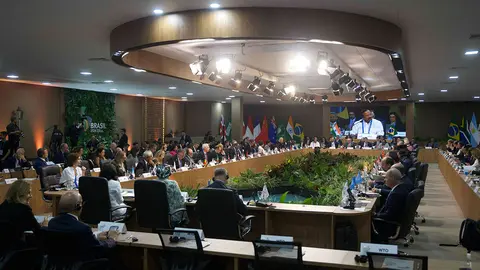Ukraine: two years on

It is two years since Russia's invasion of Ukraine and my first lines are dedicated to the fierce resistance of Ukrainians for giving their lives to prevent a bloody invader from taking their homeland, their identity, their anthem, their flag, their lands, their rivers, their lives and their future.
I want to honour those thousands of Ukrainians who have seen their reality transformed into a trench; to them who have put their dreams aside and died repelling the enemy, my sincere appreciation.
I also think it is worth acknowledging the figure of Volodymir Zelenski, who never ceases to surprise because in the face of adversity he has grown up and not even the Russian dictator himself, Vladimir Putin, expected that a comedian who has made his career dramatising the funniest situations on television would end up standing toe to toe with this thug.
If the Kremlin thought the Ukrainians would run away, it was wrong. If Putin thought that Zelenski would end up in exile in the United States with his family, his predictions failed this former KGB agent.
The Russian military has been inflicted with heavy casualties: Russia, above all, has lost important and very expensive military ships such as the Moskva in April last year, the Novocherkassk in the Black Sea and, most recently, the Caesar Kunikov, with a battery of Magura V5 drones, was attacked.
According to the White House, Ukraine has disabled a third of Russia's Black Sea fleet; the tally includes twenty-five ships and a submarine, some of which have been sunk and others rendered unserviceable.
While Zelensky is recognised for his leadership role and courage, the Russian dictator's antagonistic figurehead has been cornered even by the decision of the International Criminal Court to issue an arrest warrant for the Russian ruler.
In March last year, the UN-backed Pre-Trial Chamber of the International Criminal Court (ICC) issued an arrest warrant for Putin for his responsibility for alleged war crimes related to the deportation and illegal transfer of children from Ukraine to Russian territory. Children whose whereabouts are unknown and who were taken from their Ukrainian families.
On the subject
The EU is not the only victim of all the geopolitical and geo-economic conflicts; China has been added to the delicate situation that is taking its toll.
Not all countries are weathering the geopolitical storm and the geo-economic gale with the same resilience. China's economy is a clear example of vulnerability in the face of today's major challenges: its GDP last grew by 10.6% in 2010 and by 5.2% last year; the most recent OECD report estimates GDP growth of 4.7% by 2024 and will continue to lose steam for the foreseeable future. China's slower growth is bad news for the global village.
The moderation in Chinese growth will happen despite additional policy stimulus to try to revive weak consumer demand. The economy is also dragged down by problems in its housing market.
Not only has its GDP been hit by the coronavirus pandemic, but geopolitical tensions are having a boomerang effect on its plans for investment and the extension of its New Silk Road.
And, as if that were not enough, the Houthi attacks in the Red Sea and Suez Canal are delaying the delivery of millions of containers of Chinese goods that have now lost competitiveness as they take longer to reach European and African ports; and, on top of that, they do so at a higher price.
As long as the war in Ukraine continues, plans to expand the New Silk Road through Ukraine to the rest of Europe cannot be realised by the Beijing government. China has stood idly by as Putin destroys the world, even as he destroys the Chinese economy. The Asian giant is paying a high price for its impassivity and is incapable of sitting Putin down and telling him that this war is over. And two years have already passed...



